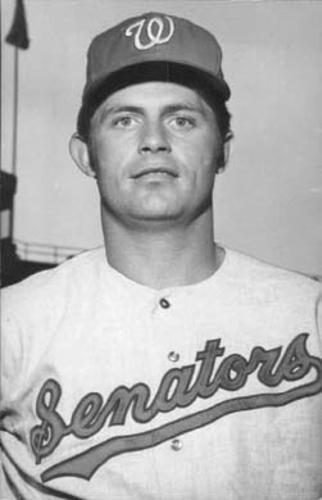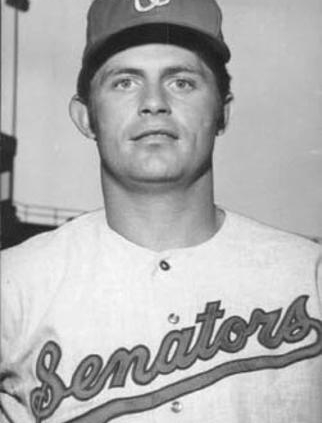September 12, 1965: Brant Alyea debuts for Washington with soggy circuit clout
 One does not expect any great level of intrigue in examining a contest two weeks before season’s end between a pair of second-division clubs. Yet we find it in the accounts of a Sunday afternoon game held in the nation’s capital in September 1965.
One does not expect any great level of intrigue in examining a contest two weeks before season’s end between a pair of second-division clubs. Yet we find it in the accounts of a Sunday afternoon game held in the nation’s capital in September 1965.
The Washington Senators and California (originally, and again later, Los Angeles) Angels were the two new clubs admitted to the American League prior to the 1961 season, making it a 10-team circuit. In each of the first four seasons of their membership, the Senators had lost at least 100 games, while the Angels had succeeded in finishing above .500 in 1962 and 1964, achieving as high as third place in their sophomore campaign.
The gap between the two clubs had closed a bit during the 1965 season. Notably, the Senators took 11 of the first 17 contests between the sides. They had split the first two games of the late-season weekend series at D.C. Stadium on September 10 and 11, with Washington winning 4-1 on Friday night and California capturing the Saturday afternoon match, 6-5. The Saturday game was plagued by intermittent rain showers that kept attendance down to 1,472, about 4,000 fewer than for Friday’s contest. The forecast for Sunday was for more of the same, and the day dawned with fog and drizzle.
As the 1:30 P.M. game time neared, the drizzle turned into a light rain. As far as Angels manager Bill Rigney was concerned, the game could be wiped off the schedule and that would be just fine by him. After all, his club had a flight home and a day off on Monday before the second-place Chicago White Sox came into Chavez Ravine for a midweek series. With both teams long out of pennant contention (the Minnesota Twins, who had played in Washington until 1960, had a magic number of nine coming into the day), there was no good reason to even open the gates with a threat of thunderstorms later in the afternoon.1
George Selkirk, the general manager of the Senators, had other ideas. The Nats (as sportswriters often called the Washington club) were a mere 3½ games back of the Angels for seventh place and finally looking respectable under manager Gil Hodges, and Selkirk insisted that the game go on. “We have a chance to finish ahead of the Angels for the first time and we’re going to make every effort to do so,” Ross Newhan of the Long Beach (California) Independent quoted Selkirk as saying.2
Indeed, the game start was delayed for nearly an hour, but by the time the teams got underway, the precipitation had temporarily reverted to drizzle. The contest was played through, as the rain eventually returned but never became intense enough for plate umpire Bill Haller to halt the proceedings. The fans had already made their decision: only 840 of them passed through the turnstiles of the East Capitol Street facility that afternoon. It was the smallest crowd in the American League so far that season3 and the smallest in stadium history.4 (Forty miles to the northeast, the Baltimore Orioles called off their game against the Kansas City Athletics.)
Rigney’s hands were tied by the rule that the home team determines the fitness of the grounds for play and the concurrence of the umpires, so the Angels manager sent Dean Chance to the mound. The 24-year-old hurler from Wooster, Ohio, had posted a 20-9 season with 11 shutouts and a 1.65 earned-run average the year before. After the season, the writers bestowed the American League Cy Young Award upon him for his stellar performance. But in 1965, the right-hander struggled for much of the campaign, particularly with his control. His walks per nine innings rose from 2.8 to 4.0, and pitching in the capital’s sloppy conditions during the matinee game did him no favors. He gutted his way through five innings, walking five and allowing seven hits and three runs to take his 10th loss. (Chance went on to win his last two decisions of the year, finishing at 15-10.)
John Hall of the Los Angeles Times referred to Washington’s starter, Frank Kreutzer, as “a much more seasoned mudder.”5 The bespectacled 25-year-old southpaw out of Villanova University had started in about 40 percent of his appearances for the White Sox in 1964 and he was used in a similar role by the Senators in 1965. Kreutzer proceeded to go the distance in the soggy afternoon contest, scattering seven hits, allowing one run, giving up one walk, and striking out five.
In the second inning, Chance allowed a single to Frank Howard. After a walk to Dick Nen, Ken McMullen bunted the runners over, prompting the Angels to issue an intentional walk to catcher Jim French so Chance could face Kreutzer. Chance won that battle and the Nats left the bases loaded. But in the third inning, Chance walked leadoff hitter Fred Valentine, and the speedy center fielder stole second. Chance induced a popup from Don Blasingame and got Willie Kirkland to ground out to second. But Howard hit a slow roller to short and beat it out, enabling Valentine to score from third. In the fourth, Ken Hamlin led off with a double off Chance and French singled to center, bringing Hamlin around. French was thrown out trying to stretch his hit into a double, but the Senators had a 2-0 lead. They extended it in the fifth, when Howard drew a one-out walk and, after Nen grounded out advancing the runner, McMullen hit a two-out single to left, scoring Howard.
With Chance clearly laboring, Rigney turned to his bullpen for the sixth. Rudy May, a lefty thrower, took the hill as part of a double switch. May got off to a rough start, walking French, the first batter he faced, and French stole second as Kreutzer batted. May struck out Kreutzer, but Valentine beat out an infield single to put runners on the corners.
Hodges sensed an opportunity to put the game away, and he called on right-handed rookie outfielder Brant Alyea to pinch-hit for the lefty Blasingame. Alyea, from Rutherford, New Jersey, and Hofstra College (now University), had been called up from the Hawaii Islanders of the Pacific Coast League earlier in the week along with Valentine. He had been announced as a pinch-hitter in Saturday’s game, but when the Angels inserted a righty reliever, Alyea was called back to the dugout without seeing a pitch. On Sunday, however, the Angels, already trailing 3-0, were not about to turn to another hurler, so Alyea stood in at the plate. He promptly launched May’s first pitch well over the left-field wall to double the Senators’ lead.6 Alyea became the ninth player to homer on the first pitch he saw in the major leagues, and the first American Leaguer to do so as a pinch-hitter.7
With Alyea’s place in baseball history secure, Hodges sat him down in the seventh in favor of Don Lock. The Senators would tack on another run in their half, on a second RBI single by French, another rookie who had spent most of the season with the Double-A York (Pennsylvania) White Roses.8 The Angels averted the shutout by mounting a mini-rally in the eighth. José Cardenal and Bobby Knoop both singled to center, and Cardenal was on third when Jim Fregosi hit a sacrifice fly to right for the game’s final tally. With both clubs eager to get out of the weather, the 7-1 Senators victory was completed in a brisk 2 hours and 16 minutes. The clubs succeeded in beating the worst of the rain; a thunderstorm hit the area about an hour after the game ended, dumping about half an inch on the region.
Hall’s Los Angeles Times story noted that Senators management declared that all tickets for the Sunday contest would be honored as rain checks, despite the game being played to completion. As it happened, despite the Nats taking two-thirds of their games from their cross-country counterparts and reaching 70 victories for the first time, the Angels would again finish the season ahead of them in the standings, this time by five games.
The Senators did not finish better than the Angels until 1969, when they took fourth place in the American League East, 10 games over .500, under manager Ted Williams.
After his short stint with the 1965 Senators, Alyea spent 2½ seasons in the minors before returning to the Nats in mid-1968. He would later play for the Twins, Oakland Athletics, and St. Louis Cardinals, finishing his career with 38 homers over parts of six seasons.9
Sources
The author thanks SABR member Jacob Pomrenke for links to stories in California newspapers.
https://www.baseball-reference.com/boxes/WS2/WS2196509120.shtml
https://www.retrosheet.org/boxesetc/1965/B09120WS21965.htm
Photo credit: Brant Alyea, Trading Card Database.
Notes
1 While the accounts in the Los Angeles Times and Anaheim Bulletin reference rain all morning, surface observations from nearby airports (Washington National Airport in Arlington, Virginia, and Hyde Field in Prince George’s County, Maryland) show only drizzle until late morning, when it turned to light rain. At National Airport, 0.04 inch of rain fell between 11 A.M. and 2 P.M.; this was the rain that delayed the start.
2 Ross Newhan, “Dean Abdicates, Boosts Marichal,” Long Beach (California) Independent, September 13, 1965: 23.
3 “American League,” The Sporting News, September 25, 1965: 29.
4 Newhan.
5 John Hall, “Nats Dunk Dean, Slosh to 7-1 Win,” Los Angeles Times, September 13, 1965: 39. Five other late-season American League games would draw smaller crowds; a mere 409 showed up for a September 29 contest between the Red Sox and Angels at Fenway Park.
6 Sam Gazdziak, “Obituary: Brant Alyea (1940-2024),” https://ripbaseball.com/2024/02/16/obituary-brant-alyea-1940-2024. Accessed March 25, 2024. “‘With men on first and second and one out, I figure I’m going to get a breaking ball for double play purposes. So I laid back and waited and there it was,’ Alyea explained. He noted that he was a streak hitter in the minors, but he believed he was ready for the next level. ‘If I can hit 27 homers in Triple-A, I believe I can do it in the majors, and 27 home runs is where the big money is.’”
7 Ed Eagle, “Players with Home Run in First At-Bat,” MLB.com, September 1, 2023. https://www.mlb.com/news/home-run-in-first-at-bat-c265623820. Accessed March 13, 2024.
8 “Senators Test Rookies – With Gratifying Results,” The Sporting News, September 25, 1965: 6.
9 The Athletics won the 1972 World Series while Alyea was part of the team, but he was left off the postseason roster because of a late-season injury.
Additional Stats
Washington Senators 7
California Angels 1
D.C. Stadium
Washington, DC
Box Score + PBP:
Corrections? Additions?
If you can help us improve this game story, contact us.


